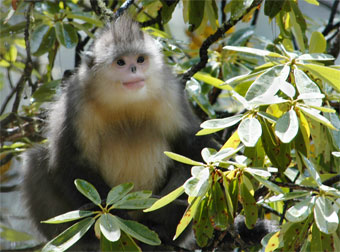Rare monkeys double in number in China but remain under threat
Rare monkeys double in number in China but remain under threat
mongabay.com
September 8, 2008
|
|
China’s population of the gray snub-nosed monkey, a critically-endangered species endemic to Guizhou Province in southwestern China, has more than doubled in the wild since conservation measures were implemented in 1979, reports Chinese state media.
The primate is the among country’s most endangered species — even rarer than the better-known panda — with a population of around 850 according to the Fanjingshan National Nature Reserve Administration Bureau, which manages the 260-square-mile (670-square-kilometer) reserve where the bulk of individuals are found. The population has increased from about 400 in 1979. The species, which is also known as Guizhou golden hair monkey, was under threat from poaching and habitat loss caused by mining and logging. Efforts to breed the monkey in captivity have met little success — only 16 have been bred since 1992.
 Yunnan Golden Monkey. Photo by Long Yongcheng / The Nature Conservancy |
The species — like two closely related species of golden monkey in China — inhabits high-altitude evergreen forests at elevations from 3,000 to 4,500 meters (9,800 to 14,800 feet), where temperatures may fall below freezing for several months in a row.
CITATION: Endangered monkey population doubles in SW China. Xinhua News Agency September 8, 2008.
Related
In search of rare, high elevation monkeys in China
Saving China’s golden monkey from extinction October 18, 2006
High in the cloud-shrouded Yunling mountains of northwestern Yunnan and southeastern Tibet (southwestern China) lives one of the world’s most elusive monkeys, the Yunnan golden or snub-nosed monkey (Rhinopithecus bieti). The species dwells in the most extreme environment of any monkey—high-altitude evergreen forests at elevations from 3,000 to 4,500 meters (9,800 to 14,800 feet), where temperatures may fall below freezing for several months in a row. Today there are fewer than 2,000 Yunnan snub-nosed monkeys remaining. Hunting and habitat loss have brought the species, which is limited to a single mountain range, to the brink of extinction. The monkeys are fragmented into 15 small sub-populations, which are at risk because of genetic bottlenecks and inbreeding.